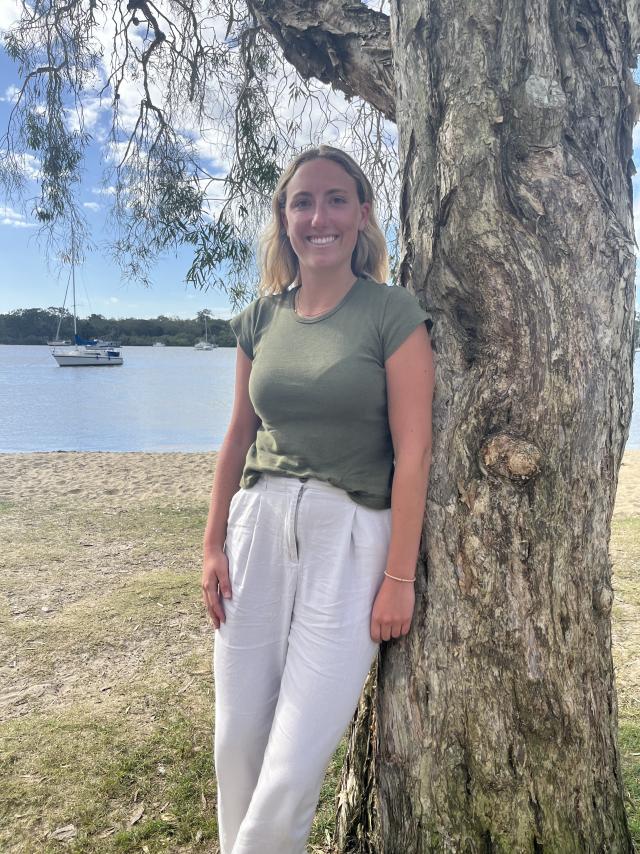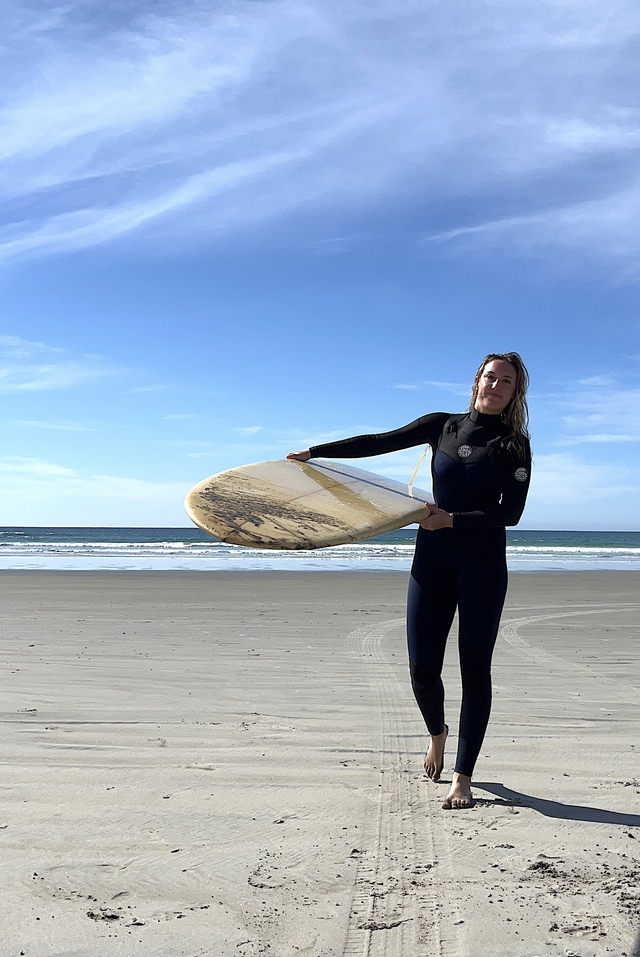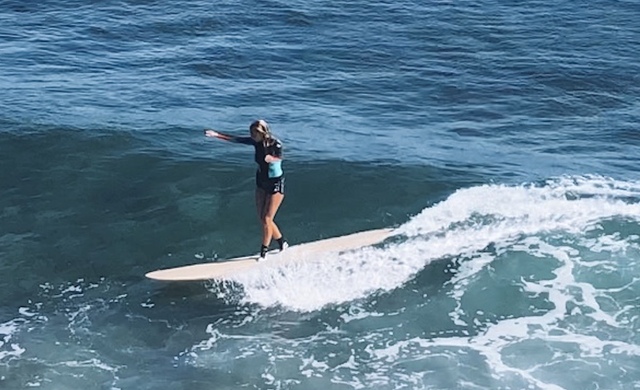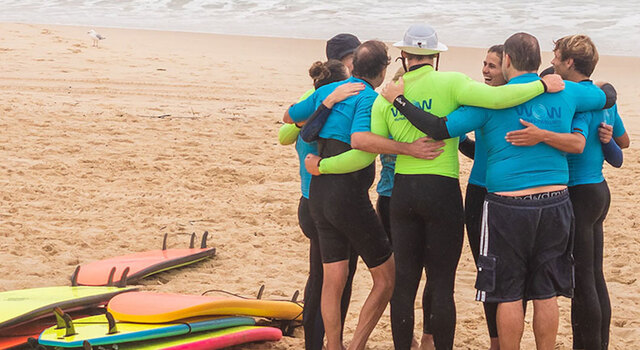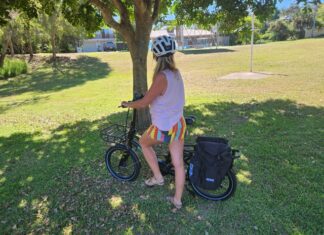When visiting psychology student and surfer Hallie Clute pushes a traumatised armed forces veteran into a first wave with a cheery, “You got this, gal”, she speaks with the authority and compassion of one who has also walked the lonely road of post-traumatic stress disorder.
It is a road that has led her to Noosa, where she is volunteering as a surf mentor with an Australian group called Waves of Wellness, helping veterans young and old overcome their PTSD through a dynamic new program which applies a concept which, inadvertently, may well have saved her life.
Three years ago, Hallie, originally from California and then just 18, was spending her gap year ski-bumming in the Rockies while living in Boulder, Colorado. In the middle of a chilly March day in 2021 she finished up a gym session and drove a few blocks to King Soopers grocery store, swinging into the parking lot to grab some supplies.
She gazes out on the sparkling Noosa River and takes a long sip on her beer before taking up the story: “As I’m parking I hear this banging noise, like someone jumping on my car, loud and making the car shake. Then about five feet away, right in front of me, a man jumps out of his car with a gun, a Ruger AR-15, and shoots two people dead. Suddenly all these people come running out of the grocery store and bam, bam, he starts shooting at them, killing eight more.”
Now 21, the psychology major at Wake Forrest University in North Carolina takes another pause to gather herself before continuing. This is a story she must tell because it explains everything, but every telling still hurts. “I didn’t know what to do but I just reversed out of the lot and almost got hit by a bus. I was in such shock, sitting behind the wheel at the side of the road, that I didn’t think to call the police, I called my room-mate. She goes, ‘Call 911!’ She just keeps yelling that so I hang up and dial it. I was the first person to call the shootings in. And that was the start of it.”
Long weeks of explaining to FBI agents and therapists what she saw and how she felt lay ahead, but as fast as she could, she took refuge in the bosom of her family in Lake Tahoe. But even surrounded by loving hugs, Hallie says she felt a growing state of disassociation.
Back in Boulder she had her first panic attack while driving. She recalls: “I’d never experienced anything like it. I went numb and thought I was dying. I managed to pull over and just sat in the car, paralysed for about an hour. When I finally got home I went into this state of nervous shock and depression, couldn’t leave my room. Whenever I tried to I had no energy, couldn’t walk and would just crawl around. I found out later that I was experiencing particularly bad symptoms of post-traumatic stress disorder.”
About a month after the mass murders, Hallie’s family – mum, dad and little sister – were heading off on a long-planned surf trip to Mexico, based at the timeshare they had in remote Scorpion Bay, southern Baja California. She decided to join them, hoping that the stark beauty of the place and being immersed in the waves of its point breaks might help to heal her.
Hallie recalls: “There’s nothing to do there but surf. It’s heaven! Almost immediately I started to feel well again, just that sensory feeling of paddling through the water was like medicine to me. I felt alive and safe in my own body again. I genuinely believe that surf trip got me back on the right track to healing, getting me out of the hole I’d fallen into.”
She didn’t know yet that it had a name, but Hallie had discovered a very real form of practical mental health therapy which has been gaining wide acceptance amongst health professionals for several years.
It’s known as surf therapy.
According to the US-based International Surf Therapy Organisation, it “involves the use of surfing, the therapeutic elements of the ocean, and structured water activities tailored to each individual’s needs”.
As a 2022 research paper published by the respected International Journal of Environmental Research and Public Health noted: “An intervention that uses surfing (physical activity) with therapeutic elements of the ocean as a vehicle to achieve positive change is called surf therapy. Carefully planned water activities tailored to the needs of the individual can contribute to correct psychosocial and cognitive development.”
Summarising the therapy’s benefits, the paper noted, “improved physical health and mobility, [and] improved mental health, including reduction of specific symptoms, such as post-traumatic stress and depression.”
Following her self-administered surf therapy program in Baja, Hallie not only recovered but also decided on a new career direction.
She recalls: “My parents are both successful entrepreneurs and my whole life I was going to be a business major. I’d already done a marketing internship earlier that year, but felt no real sense of purpose there. Now I knew I was going to study psychology and somehow relate that to surfing, which I’d been obsessed with since I was about five.”
Once she heard about what Waves of Wellness (or WOW) were doing in Australia, Hallie decided to link spring break and the summer vacation and volunteer, spending a couple of months of practical study and research in the field (or more correctly, in the surf) before heading back to Wake Forrest U for the final year of her psychology degree. The program she’s been working on in Noosa has exceeded her expectations.
She says: “We have veterans coming from all over the Sunshine Coast and some even from Brisbane. At 6.30am we walk down to the beach with our foamie boards and put them in a circle and all sit down. There’ll be a different topic each time.
“Today it was self-esteem. It’s all very casual and the program facilitators do an incredible job with the program. Being surfers themselves, they just make it a comfortable environment for everyone. They keep it light-hearted but there’s a real method in getting people to talk about their feelings, and then relate them to surfing. As they get into this process they open up about themselves and start to use the tools that the facilitators are teaching them. What we do with them is having a shared experience, which some of them have never felt in other forms of therapy, and learning to surf gives them a huge sense of purpose.”
The veterans Hallie has been working with range in age from 27 to 68, about equal gender numbers, and most have served in Afghanistan. She says that almost all of them seem to be benefiting enormously, but this is only part of the work of Waves of Wellness, which stretches across most of the frontlines of mental health.
Apart from pushing the vets into waves and keeping the vibe alive, Hallie has been using the volunteering opportunity to work on an independent observational research project she hopes to publish on “the variables of surf therapy and the value of environmental factors, such as being on the beach or in the surf.
“The hypothesis of my research is that surf therapy overall has a greater impact on veterans than other therapy methods. I’m looking at the collusions between the veterans themselves and with the program facilitators and how they improve over the course of the therapy. When I get back to college I’ll present my research on undergrad research day.”
But how, I wonder as we finish our beers, will she be able to apply all that she has learnt and experienced when she graduates as a psychologist this time next year?
“What I really want to do is work with a surf therapy organisation like WOW and help them develop more specific programs for veterans who currently don’t get any training to help them move away from years of being conditioned to fight with no flight. They need to be retrained to a more balanced outlook, and I think surf therapy could help.”

